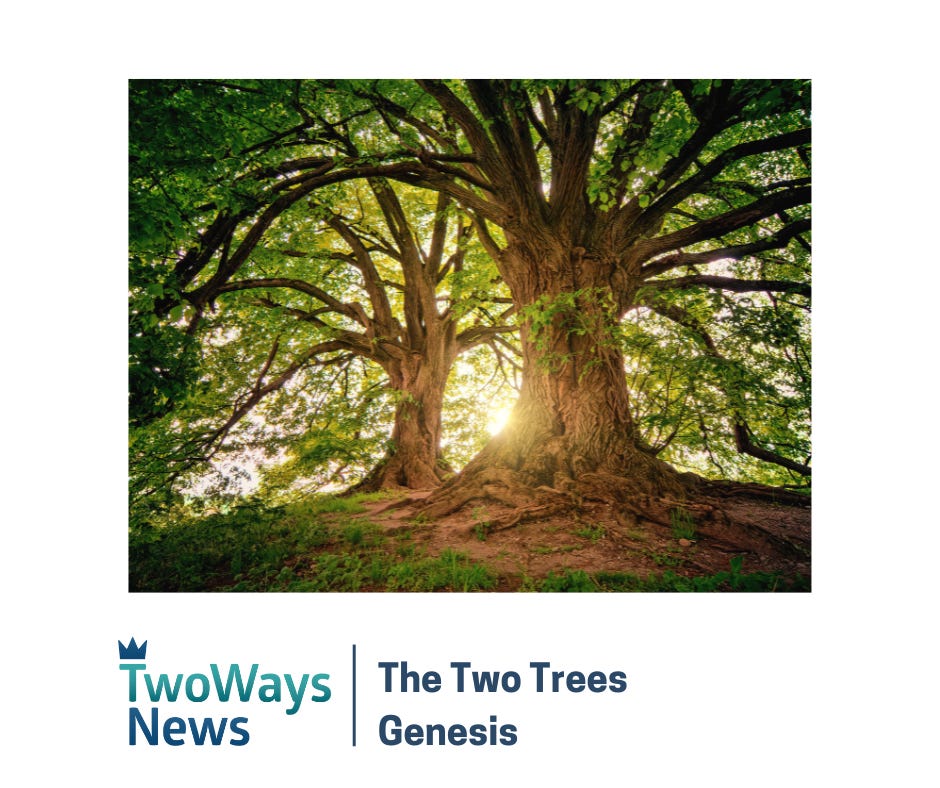Dear friends,
In the middle of the garden, full of beautiful trees, there are 2 trees in particular. What is the importance of the tree of life? What is it telling us about God’s plans for humanity? Why is it singled out for special mention?
The other, the tree of the knowledge of good and evil, seems to be even more important in establishing the drama of life in the Garden of Eden and subsequently the storyline of the rest of the Bible. But what does it mean to eat the fruit of the tree of the knowledge of good and evil?
I hope our discussion prompts more discussion among you and your friends.
Yours,
Phillip
Phillip Jensen: I'm Phillip Jensen here with my brother Peter, as we once more look at the world through the eyes of the Scriptures, and particularly through the eyes of the early chapters of Genesis. Today we're looking at a very short passage in Genesis 2 about the trees. It comes in two phases, in verse 9 and then again in verses 15 through 17.
Peter Jensen:
Genesis 2:9
And out of the ground the LORD God made to spring up every tree that is pleasant to the sight and good for food. The tree of life was in the midst of the garden, and the tree of the knowledge of good and evil.
Genesis 2:15-17
The LORD God took the man and put him in the garden of Eden to work it and keep it. And the LORD God commanded the man, saying, “You may surely eat of every tree of the garden, but of the tree of the knowledge of good and evil you shall not eat, for in the day that you eat of it you shall surely die.”
Phillip: There are many features of the garden, how it arose out of the mists rising on the waters, etc. The description of the two trees is both surprising and central to the account. What do we see as the importance of having the tree of life in the middle of the garden, Peter?
Peter: The tree of life was necessary because you ate of it in order to keep living. In other words, Adam was still a man. I always think Adam could have tripped over something and hurt himself. I don't think he was living in such a world that it was just impossible for him to hurt himself. So, I think the tree of life was God's provision for him that he may keep on living in this world.
Phillip: Do we describe humans then as mortal? Doesn't death come after this rather than in this?
Peter: It's funny, isn't it, that the Lord says on the day you eat of it you shall surely die? But they didn't.
Phillip: I think they did.
Peter: I don’t think they did. That just shows you're wrong again.
Phillip: Tell me why I'm wrong because I think you're dead now. In the same way that the flowers cut from the garden and put into a vase are dead. They look alive, they still smell sweet, and they might open with greater blossoms, but they're actually dead because they've been cut off from life, and so they're dead. I think God said from here on in you will die, and so from here on in we do.
Peter: And fundamental to that death, I have always presumed, is expulsion from the Garden of Eden. Expulsion from the tree of life and expulsion from fellowship with God. For God walked in the garden during the day, as we're told in chapter 3, but this is no longer going to be the case. So, death is a bigger word than mere mortality. It has to do with the death of relationship. Now, mortality may follow from that.
Phillip: But would Adam have gotten older in the sense that we get older, not just the passing of time, but the bagging, the sagging, the wrinkling, the balding, all those aspects of ageing that we find so unattractive? They're all the aspects of a dying man, not a living man.
Peter: Well, two things here. First of all, we don't know. Secondly, it is again mere speculation because we are not told, but on one or two occasions in scripture someone doesn't die, but they pass into the presence of God, not touched by death. This may indicate that Adam had a future in a sense to which the garden pointed, but it was, can I say, beyond the garden.
Phillip: Well, your Adam tripping over and hurting himself is speculation.
Peter: It is, and we need to observe that. However, think of the reverse. You mean if he tripped over, he wouldn't hurt himself. Therefore, is he truly one of us? Is he living in the world? What are we talking about here? Who are we talking about here?
Phillip: See, from your view of the creation of a real man in a real world, you move to the speculation of his tripping and hurting. From the teaching of death as being the reality of the day that you eat, I move to the character of our bodies being so mortal now. So I'm not expecting him to share the same death-like features that you and I share. The Bible says he would die that day. And I see no reason to assume that the Bible was wrong on that. So, my view of life is we are in death.
Peter: And you have offered the explanation of the flower to explain why he didn't die that day.
Phillip: He continued to live in death. Previously he didn't, because he had access to the tree of life. I presume it was there to constantly feed on.
The tree of life is an interesting one. It is saying that there is something different about Jesus, about God. For Adam does not have life in himself. In John chapter 5, we're told that Jesus was given to have life in himself. In 1 Timothy, God is said to be the only immortal. Immortality is of the character of God, and therefore of God's son, the man Jesus, who, though he died on the cross, was still immortal, and so death could not hold him. Adam was not immortal, which is why he had to have access to the tree of life. We don't have life essentially within ourselves.
Peter: I accept that view, and it means that if he didn't eat from the tree of life, he would die.
Phillip: In talking about this tree, there is a very important issue to raise concerning the very nature of what our life is like. The tree of life speaks to the contingency, the dependence of our existence in this world. We are not the gods of this world in that sense. At the end of chapter 3, we are no longer fit to be given access to the tree of life.
Peter: The essential point is that from the very beginning, human life depended upon the provision of God at every point. It is never independent of God. The wonderful enjoyment of Adam, of the freedom of the garden, is a freedom given to him by dependence on God, paradoxical though that may seem.
Phillip: That takes us to the other tree because that's the key one that stopped us from having that access to the tree of life. That is the tree of the knowledge of good and evil. What do you think that symbolizes, Peter?
Peter: It is God who has the knowledge of good and evil. That is to say, God is responsible for good and evil. It is his will, his word, and his command that create good and evil. And in calling it the tree of the knowledge of good and evil, it is really saying, if you were to eat of this, you are putting yourself in God's place. You are deciding that from now on, you will call the shots. You'll be the one to say what is good and what is evil. It's a very interesting insight into the human heart as we know it. What do you think?
Phillip: Firstly, it's not an apple.
Peter: No, it never says it's an apple.
Phillip: So where did we get the apple from?
Peter: Thank you, Granny Smith.
Phillip: Granny Smith was a very fine Christian woman, and her grave is in the parish of Ryde, isn't it?
Peter: Yes, it's in the churchyard there.
Phillip: Australia has contributed very little to the fruits of the world, but the Granny Smith apple is our contribution. To explain for our overseas friends, it was a hybrid created by a Christian woman in the suburb of Eastwood, but she was buried in Ryde.
Getting back to the fruit of the tree, it wasn't an apple, nor was it having sex. That's the kind of Mae West Hollywood view that sex is itself evil. It's not just in Hollywood; I think you'll find it within certain Islamic traditions, too, that Eve is the great temptress. She was not the temptress, and having sex was not in any sense the temptation.
But we talk about ‘knowledge,’ and we talk about ‘good and evil.’ There are two issues. Take ‘good and evil’ first. To say ‘the knowledge of good and evil’ is to say that there is good and evil. That's very different to what the Western secularist mindset says.
Peter: Most people who may not believe in God or may be agnostic still have a sense of good and evil. Many of them jump onto their soapbox regularly and chastise the rest of us for some cause or other, indicating that they believe in good and evil and telling us that we are evil in our behaviours. But I think an honest atheist, a person who actually follows through on their fundamental beliefs, will have to come to the conclusion that there is no way in which we can describe what is good and evil.
Phillip: Objective evil is rejected by utilitarians. Kant and some of the Enlightenment people tried to retain it and defined it in a way that could make it work, but it doesn't work. Jesse Prince, who's a philosopher at New York University, following many other people, just sees the phrase ‘good and evil’ as just emotional expressions of approval and disapproval. It's not actually objectively there; it is just how I react to it.
Adam Smith would see morality in these kinds of terms of approval and disapproval, rather than any objective. There is good, there is evil, there is right, and there is wrong. Interestingly, Luc Ferry, the French philosopher, follows the logic to modernity and postmodernity, where there is neither good nor evil. But the massacre at Srebrenica forces him to reject the notion that there is no such thing as good and evil. When you see what was done to those people, you must say there is evil. That is why in the debates on the web they say that within five or six steps, someone quotes Hitler. It is because we still are haunted by the Holocaust, or at least we need to be. It has that sense of there being an objective evil.
Right here in the beginning of Genesis, it is declared that there is such a thing as good and evil. So that's one aspect of seeing the truth.
The other aspect is the ‘knowledge.’ It's the meaning of the word knowledge that is the problem. Just as some people have the fruit of the tree as an apple and others have it as sex, some clever people have knowledge. But it's not just knowledge. It's ‘knowledge of good and evil.’ It's a particular knowledge, a particular way of knowing.
Peter: It is becoming like God in the sense of determining good and evil, which God does. But we would have to take upon ourselves the God-like attribute of, if you like, determining good and evil.
Phillip: Reading on a little bit in chapter 3. When they do eat the fruit of the tree of the knowledge of good and evil, and we need to talk about this in future podcasts, but when they do, their eyes are opened. That's the first thing. The second is they see they're naked. When they could have seen already, their eyes were already there. But, previously, they saw without shame. Now they see in a way that needs to be covered, presumably because of fear of what each can do to the other. I don't know, but they certainly have to cover.
But then the other thing is, and the devil is so clever, isn't he? He tells half-truths: “You will become like God.” And we're told in chapter 3, they now do become like God. Well, they were already like God, so in what way have they now become like God if they were already like God? They became like God in the one way that they really weren't. There are several ways. They weren't immortal. That's why the tree of life was there.
Peter: When they eat of this fruit, their eyes are opened, and they become like God. But they're not like God, which is why they're removed from the possibility of access to the tree of life, because it would be totally unsuitable for people like this. But what they do become is autonomous. ‘Autonomous’ is a great word to describe sin, although I think it's not a word that is sufficiently widely used today to be necessarily helpful for us. It comes from two Greek words, ‘auto’ and ‘nomos,’ ‘self-law.’ The heart of sin lies in “I did it my way.” I am no longer reliant upon what God says is good and evil because I now create the sense of what is good. I now prescribe and proscribe. And so the heart of sin is not so much law-breaking but law-making. I am now placing myself outside of God's law into the world where I am a sovereign citizen of the universe. I decide what I will do.
Peter: What you have said really goes right against what our great schools are saying is the purpose of their human life. If you go online and look at their websites, the graduates are going to take over the world. They are going to change the world. And they are told, if you want to do something, you can do it. Go for it. So what you are saying is wrong here is the very thing that our children are being told is the meaning of life.
Phillip: The Lord Jesus said that the devil is the liar and father of lies. And that is the syllabus that our young people are now being given: the devil's lie, a compulsory syllabus, of course, from our schools. It is the lie that will never work, because “what a tangled web we weave when first we practice to deceive.” The devil's lies build upon lies upon lies. And so the dissatisfaction, the failure, and the difficulties of life flow out of a miseducation that comes from a failure to understand what is being said here, right at the beginning of the Bible in Genesis 2 and into 3.
Peter: The funny thing is that actually, it's not in our best interests. Because if you're looking for true freedom, it is based on justice. It is based on order. It is based on submission. Those who have submitted to God and become, if you like, the slaves of God who know what true freedom is.
Phillip: There is no greater tyranny and bondage than to self and Satan. In their attempt to be free from God to do their own thing, they have joined Satan's rebellion, which puts them under bondage to self. It's very hard not to be selfish when you think you are God.
Scripture quotations are from The ESV® Bible (The Holy Bible, English Standard Version®), copyright © 2001 by Crossway, a publishing ministry of Good News Publishers. Used by permission. All rights reserved.
Freely available, supported by generosity.
If you enjoy Two Ways News, why not lend us a hand? Consider joining our Supporters Club—friends who make it possible for us to keep producing this article/podcast.
To join the Supporters Club, follow the link below to the ‘subscribe’ page. You’ll see that there’s:
a number of ‘paid options’. To join the Supporters Club take out one of the paid ‘subscription plans’ and know we are deeply grateful for your support!
also the free option (on the far right hand side)












